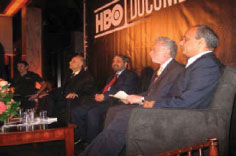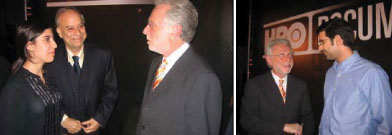The Journalist and the
Jihadi
By Marta Zoladz
American University
Washington, DC
 Group
picture of the interfaith panelists
Group
picture of the interfaith panelists |
The
French Embassy was full of life on the evening of October
5, 2006. Washingtonian professionals, professors and intelligentsia
gathered and sipped on cocktails and discussed current events
while waiting for the premiere of a new HBO documentary.
La Maison Francaise was hosting the debut of The Journalist
and the Jihadi: The Murder of Daniel Pearl directed and
produced by Ahmad A. Jamal and Ramesh Sharma. Amongst the
distinguished guests was Ambassador Akbar Ahmed who not
only attended this lavish evening but also took part in
the discussion panel moderated by CNN’s renowned journalist,
Wolf Blitzer.
The film narrated by Christian Amanpour explores the lives
of two educated men with privileged childhoods but divided
ideologies that lead to a tragic end. Pearl’s story
is portrayed through the words of his family, friends, colleagues
and State Department employees who were involved in his
case. They describe Daniel Pearl’s ruthless character
in seeking understanding in the Muslim world, his love and
determination for journalism, the well-organized plot for
his kidnapping and the tragic result of his death. The film
also explained the life of Omar Sheikh and all the events
that led him to become the mastermind of the kidnapping
of Daniel Pearl.
This
intense film shows the animosity and misunderstanding between
the divided cultures of the West and Islam. Through actual
footage and photographs the audience was introduced to Omar
Sheikh as a privileged, young man who attended elite schools
in Great Britain and explained the events throughout his
life that made him turn to violence in support of his beliefs.
Daniel Pearl was living a parallel life in California as
the son of a well-educated Jewish family. His career as
a journalist advanced rapidly due to his charisma and curiosity
that in turn led him to Pakistan in search for answers.
The film goes even beyond the two men and explains the law
and order situation in Pakistan. The directors paint a vivid
picture of the overcrowded streets of Karachi and the chaos
within the society. The directors interviewed Pakistani
police and Muslim scholars to illustrate what was happening
throughout the kidnapping.
 |
Prof.
Akbar Ahmed (center), Wolf Blitzer (right) and Miss
Ahmed |
Umar
Ahmed (right) and Wolf Blitzer |
After
the movie the guests sat down to dinner and listened to
a panel discussion between two Indian directors Ahmed A.
Jamal and Ramesh Sharma and former Pakistani Ambassador
to the UK Akbar Ahmed. Wolf Blitzer led the conversation
by asking striking questions about the film, what message
the directors wanted to convey and current sentiment about
Islam.
Ambassador Ahmed began the conversation by stating that
“only in Washington could Indian and Pakistani sit
together and agree on issues”. Ambassador Ahmed suggested
that it is Islam that is under attack and not just one person.
“We must look at the whole scenario together. This
is a challenge for the whole world,” he urged. “People
such as Sheik have brought a negative image to this religion
that is not truly representative of what it preaches”.
Ambassador Ahmed says that the solution is to bridge the
cultures through dialogue and showing films such as this
one. The two directors explained that this film tries to
show that behind every person there is a family, love, peace
and relationships and they hope that this will have an emotional
effect on people.
The panelists agreed that in this divided world that we
live in it is important to show films of this degree to
explain understanding and what is happening with the growing
hostility.
After the panelist discussion, Ambassador Ahmed and Wolf
Blitzer continued the conversation amongst themselves and
with Ambassador Ahmed’s team of students from the
American University. Ambassador Ahmed introduced his students
as the educated, future generation that will work on tolerance
and cross- cultural communications. Two of his students,
Hailey Woldt and Frankie Martin, who accompanied Ambassador
Ahmed on a two-month trip in the Muslim World, shared their
experiences of being in Karachi and their journey to build
good relations and understanding in the divided world. Marta
Zoladz, the student assistant, Ramanathan Coimbatore, Ahmed’s
teaching assistant and Jonathan Hayden, head assistant also
attended the event and had the opportunity to share their
experiences with Wolf Blitzer and what they have learned
on the importance of interfaith dialogue while working for
Akbar Ahmed.
As the evening came to an end more questions were asked
by the intrigued audience about international relations
and current events. A night such as this one does not occur
often, where people of different faiths and cultures come
together to discuss a tragedy and together through dialogue
try to bridge the gap to prevent future disasters from occurring.
-------------------------------------------------------------------------------------

